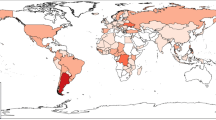Abstract
According to recent debates about transforming some portion of the foreign reserves of central banks from the dollar to the euro, this study will empirically investigate the composition of foreign reserves of the central banks of Iran, Russia, Saudi Arabia, Turkey, United Kingdom, Japan, China and Greece. Due to the fact that the composition of the foreign reserves of central banks is not available (except that of UK which is used to test the power of the model), the amount of euros in foreign reserves is estimated, using the Kalman filtering method, on the basis of time series characteristics of the foreign reserves. The Kalman filtering approach allows us to estimate the time series of the euro and the dollar in foreign reserves of central banks so that we can observe what has happened to the shares of euros and dollars. In the euro period, i.e. 1999–2009, the share of euros in foreign reserves of all countries, except Greece, has increased considerably. The evidence shows that all of these countries have moved toward further diversification of their foreign reserves portfolio, that is the relative importance of the euro in the composition of their foreign reserves has increased, while the relative importance of the dollar has decreased. The share of euros in the foreign reserves of Iran, Russia and Turkey from 2003, in Japan and China from 2002, some years later in Saudi Arabia from 2007 and in UK from 2006 has increased and the euro has become a serious rival to the US dollar. The foreign reserves of Greece have been decreasing since the euro was introduced and after 2001 the share of euros diminished considerably. At the end of the period, the foreign reserve of Greece is very small and the share of euros and dollars are the same. Although the results of the paper show that the share of euros in the foreign reserves of these countries has increased and the euro has become a serious rival for the US dollar, to answer the question that whether euro will replace the dollar, we need some time. Moreover, the issue of the recent financial crisis (2007–2009), and the impact of public debt on the role of euro in some European countries have created new environment which requires further study.
Similar content being viewed by others
References
Bergsten, C. F., Freeman C., Lardy N.R., and Mitchell D.J., 2008. China’s rise: Challenges and opportunities. Washington, DC: Peterson
Institute for International Economics and Center for Strategic and International Studies.
Chinn, M. and Frankel J., 2005. Will the Euro eventually surpass the Dollar as leading international reserve currency? NBER Conference.
Click, R. W., 2008. On the composition of Asian central bank reserves: Will the Euro replace the Dollar? Journal of Asian Economics, 17, pp. 417–426.
Cooper, R. N., 1998. Key currencies after the Euro. Working Paper, 98 (3), Cambridge: Weatherhead Center for International Affairs, Harvard University.
Eichengreen, B., 2005. Sterling’s past, Dollar’s future: Historical perspectives on reserve currency competition. NBER Working Paper, No. 11336.
Hamilton, J. D., 1994. Time series analysis. Princeton: Princeton University Press
McKinnon, R. I., 1998. The Euro threat is exaggerated. The International Economy, 12 (May/June), pp. 32–60.
McKinnon, R. I., 2001. The international Dollar standard and sustainability of the U.S. current account deficit. Brookings Papers on Economic Activity, 1, pp. 227–39.
Mundell, R. A., 1998. What the Euro means for the Dollar and the International monetary system. Atlantic Economic Journal, 26(3), pp. 227–37.
Portes, R. and Rey, H., 1998. Euro vs. Dollar: Will the euro replace the dollar as the world currency? Economic Policy, 13(26), pp.305–343.
Valderrama, D., 2005. What if foreign governments diversified their reserves? Federal Reserve Bank of San Francisco Economic Letter No: 17.
Author information
Authors and Affiliations
Corresponding author
Rights and permissions
About this article
Cite this article
Komijani, A., Tavakolian, H. The Composition of Foreign Reserves of the Central Banks of Selected Countries: Will the Euro Replace the Dollar?. Eurasian Econ Rev 1, 143–156 (2011). https://doi.org/10.14208/BF03353828
Published:
Issue Date:
DOI: https://doi.org/10.14208/BF03353828




